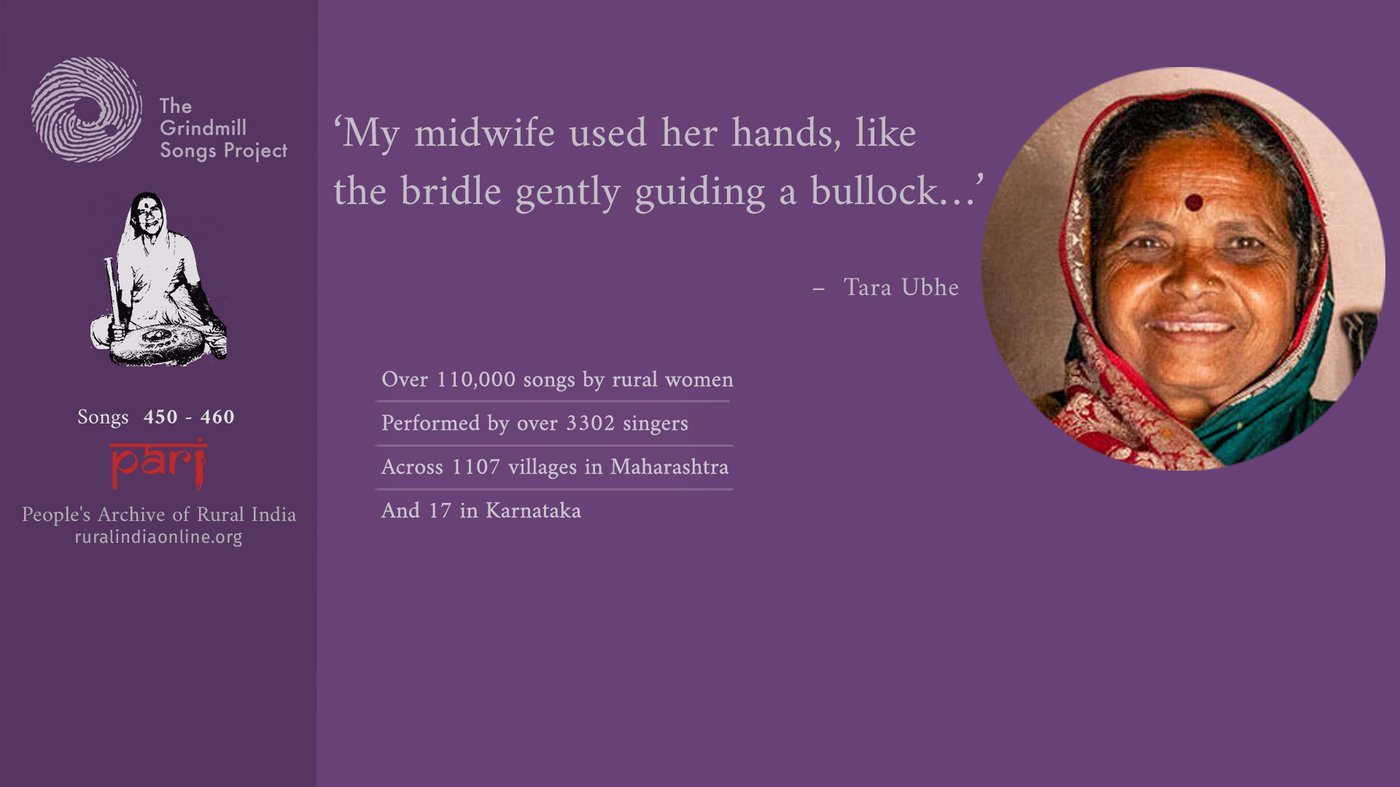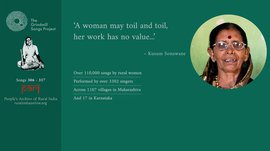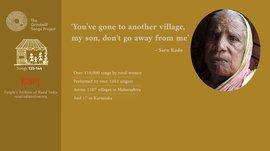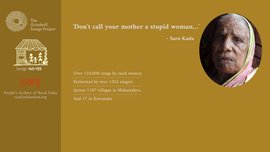Tara Ubhe, from Mulshi taluka , Pune, talks about the inception of the Grindmill Songs Project, and sings a few ovi on the importance of midwives and the loss of their invaluable knowledge
“What exactly is a woman? Is she a toy or an object? If she is a living being, then we must think about her life, isn’t it? But for long, a woman’s life has not been treated as human existence. Some people call women ‘chulichi rakh ’ [ash of the kitchen stove] or ‘kandyachi paat ’ [green stems of spring onions]. Do we regard a woman as a human being?”
Tara Ubhe’s questions, like her penetrating eyes, compel a listener to think. We met her in February 2022 at her home in Khadakwadi, a hamlet in Kolavade village, about 40 kilometres from Pune city.
She told us about her work as a grassroots leader in the villages of Mulshi as a member of Garib Dongri Sanghatana, an organisation that works among the poor in the hilly tracts of Pune district. She also spoke about the inception of the Grindmill Songs Project and its early days, when she and others collected songs for it.
The Garib Dongri Sanghatana (GDS) was formed in 1975 by social scientists Hema Rairkar and Guy Poitevin. Tarabai and a few women from Kolavade and other villages met them in the mid-1980s, and joined the organisation soon after. At the time, villages in Mulshi had no basic facilities like piped water, electricity or pucca roads. Led by Tarabai and other GDS members, women's groups tackled these problems by taking out protest
morchas
and demanding that political leaders act on these issues. Another concern, which they decided to get rid of, was alcohol addiction among the village men. “They filled alcohol in cans and big drums. We stopped them in their path and broke those drums,” Tarabai said. “There were some liquor shops beyond the school. We took a
morcha
there and destroyed those shops.”
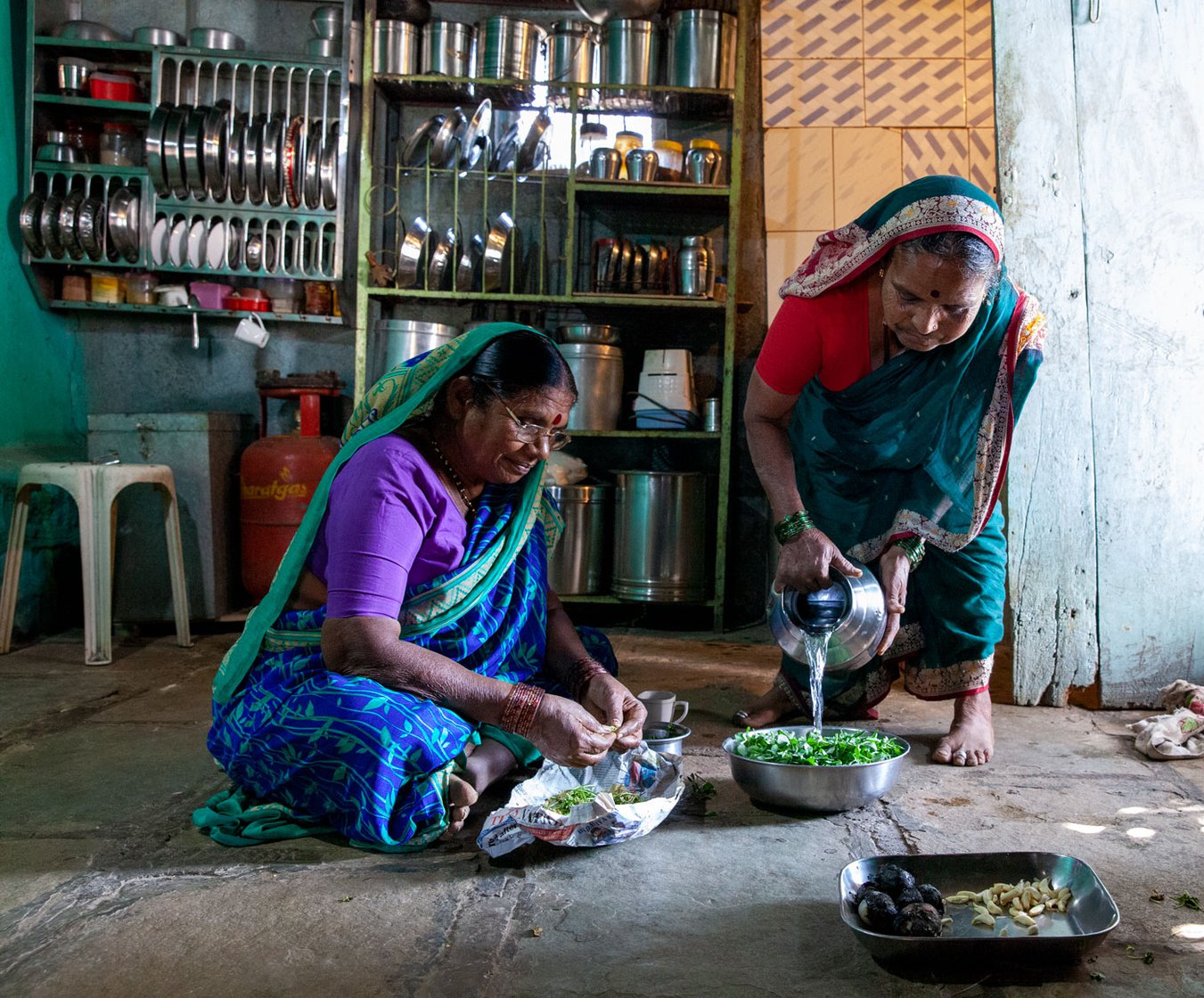
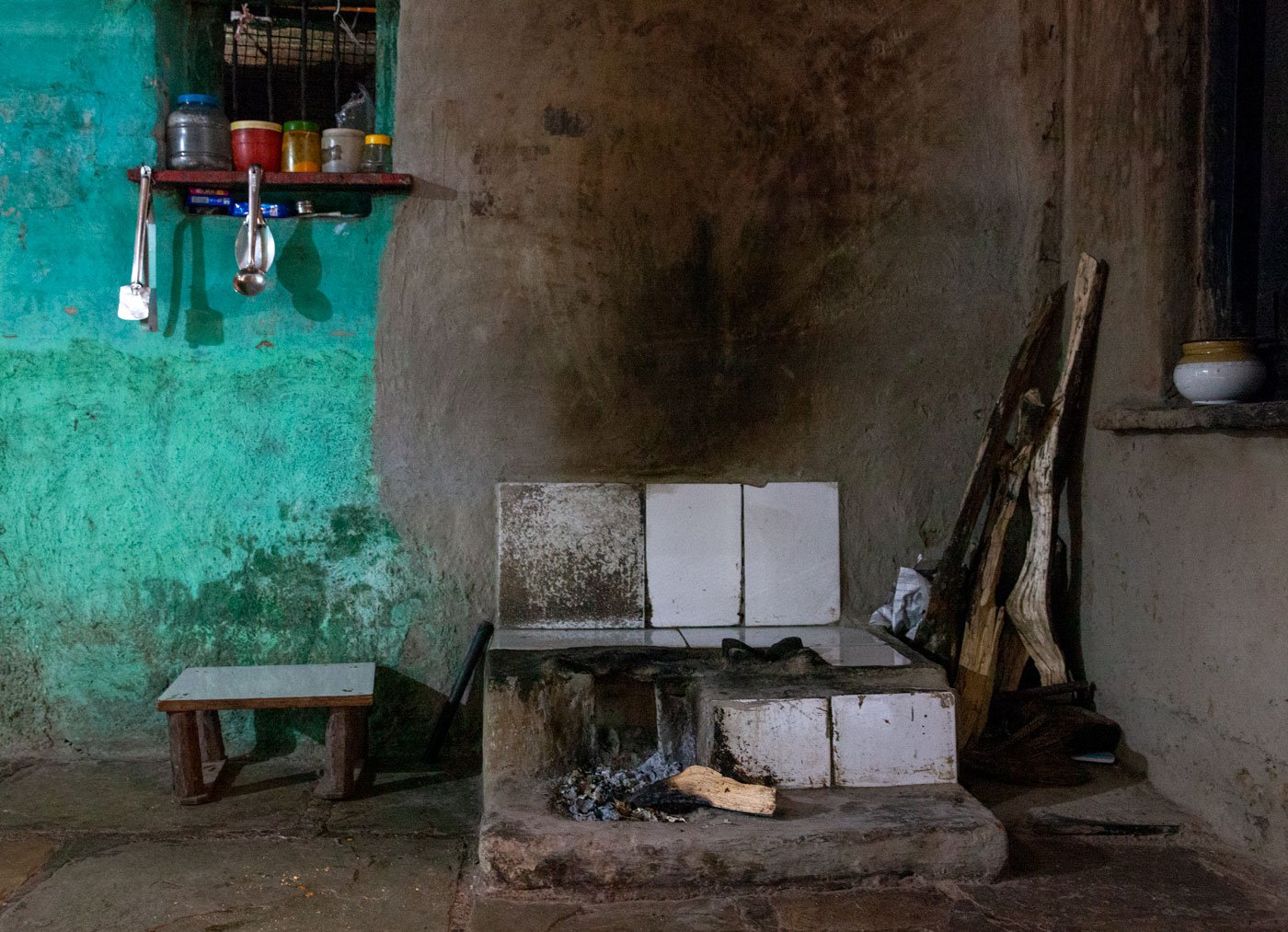
Left: In Tara Ubhe's kitchen, Lila Kamble and Tarabai prepare to cook
methi
leaves. Right: A wood fire stove in the corner of the kitchen
They also addressed the issue of caste discrimination and the practice of untouchability towards people from the Harijan Vasti, the Dalit settlement in their village. Tarabai told us about employing Lilabai Kamble, another member of GDS and a singer of grindmill songs, who is Dalit, to work as a cook in her home. Tarabai’s new house was being built then, and the workers constructing the building, who belonged to the Maratha community, refused to eat the food cooked by Lilabai. But over time, Tarabai’s insistence paid off. They dropped their reluctance and accepted the food cooked by Lilabai. The Dalits live in Harijan Vasti even today, away from the rest of the village . Their struggle for equality continues.
None of these activities were at all easy for the women. In the ’80s, women in the village, a majority of them Maratha, were not allowed to step out of their homes.
Tarabai’s husband, Sadashiv, used to work in a textile mill in Mumbai. When he returned home after a workers’ strike forced the closure of the mill, Sadashiv’s elder brother and his wife told him and Tarabai to leave the family home. They were opposed to Tarabai’s activism. The couple then worked as labourers for some years to steady themselves. They own an acre of farmland now, where they grow paddy, millets and wheat. Their three sons live in Pune with their families.
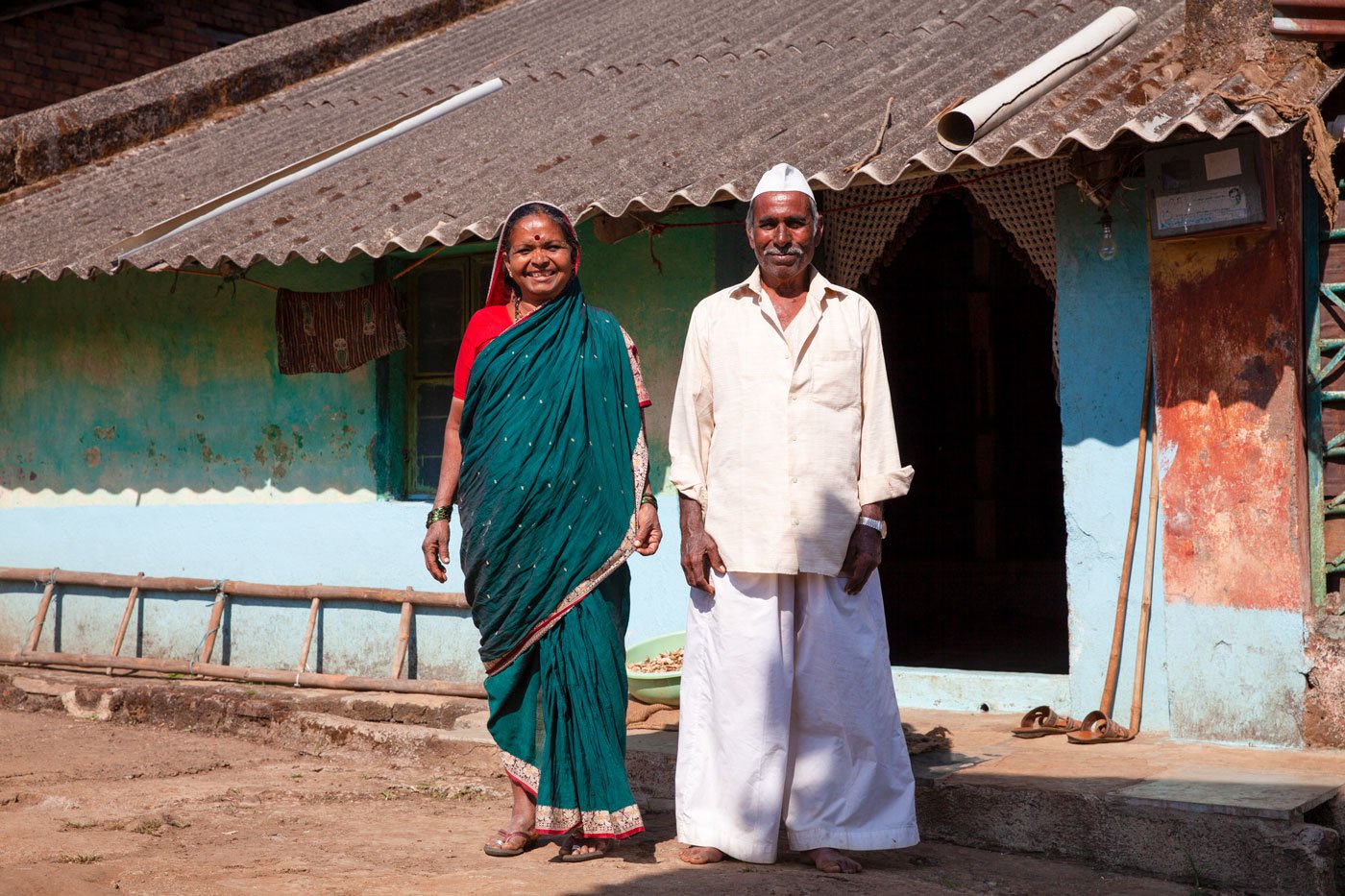
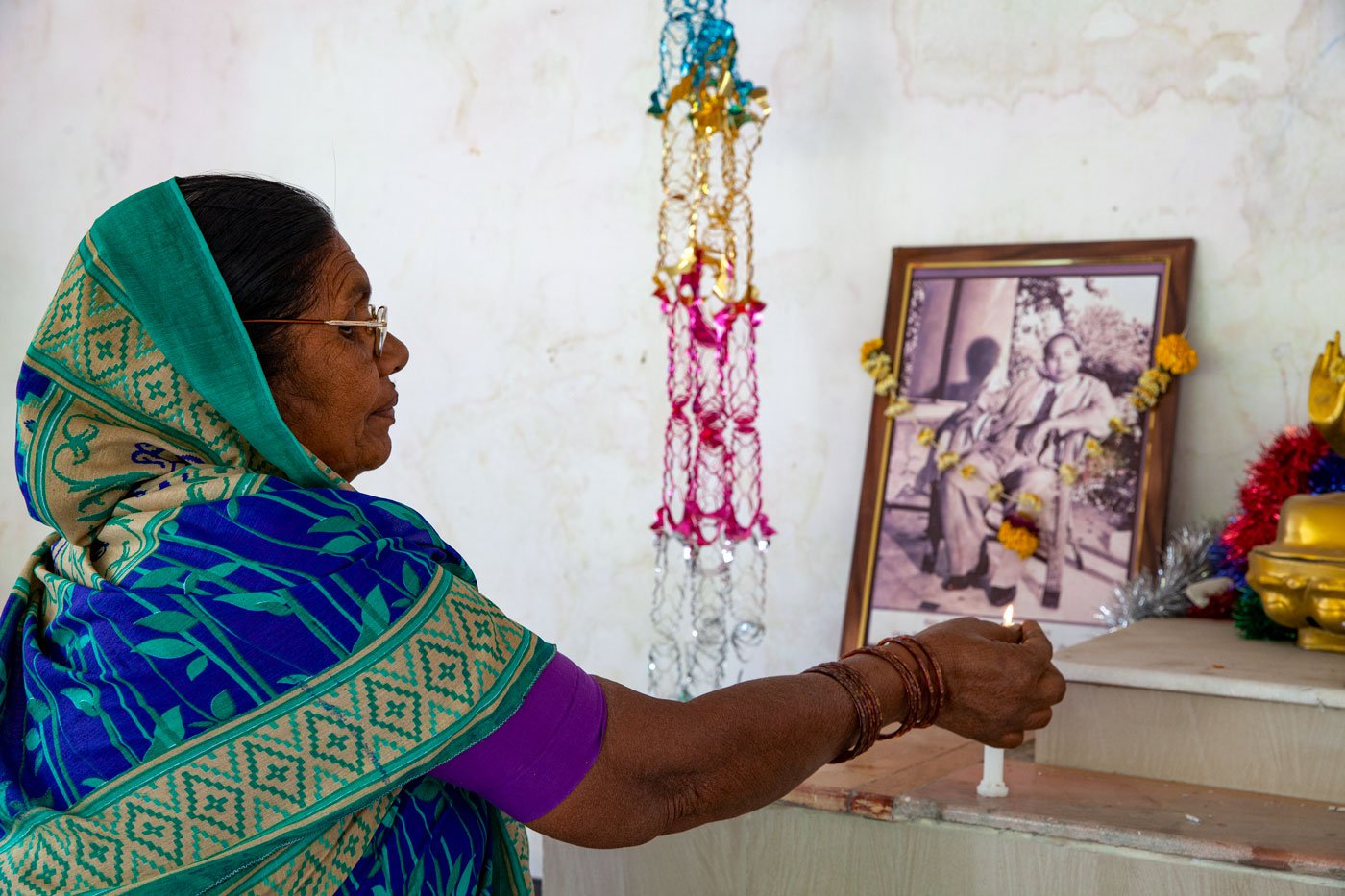
Left: Tarabai and her husband, Sadashiv Ubhe, outside their home in Khadakwadi. Right: Lilabai lighting a candle in
the Buddha Vihar in Harijan Vasti
A group of women from Kolavade including Tara Ubhe and Lila Kamble, and Kusum Sonawane and some others from Nandagaon, went to Pune city to get trained by Hema Rairkar and Guy Poitevin in organising people under the GDS. “Women from other villages opened up to us when we talked to them about the everyday challenges we faced just like they did too,” said Tarabai, who has led such activities in about 18 villages including her own. She and the others found that one of the best ways to get women to open up was by singing grindmill songs. “Every woman had her sorrows to share, but she needed the freedom and space to confide in someone. That someone was the grindmill where she worked every morning.”
*****
The grindmill is nothing but a sage from the mountains
I tell you my daughter, bare your heart to him
The Grindmill Songs Project (GSP) began in Mulshi in the 1980s and then spread to other parts of Maharashtra, covering over 1,100 villages.The team collected more than 110,000 songs over the years.
In March 1997, a group of grindmill song singers met in Pabal village, in Pune’s Shirur
taluka
, to discuss the many issues that they had to confront. There they talked about one of their major concerns: midwives in rural areas. With no easy access to hospitals and lack of medical help in emergencies, the midwife was a blessing to a pregnant woman who needed support during childbirth.
A midwife learnt by watching other midwives – usually her mother, aunt or grandmother. No qualified medical doctor could match the wisdom and experience of some these women, Tarabai said. So she and a few others composed many
ovi
about the role of a midwife and her expertise. Over time, the songs lapsed from Tarabai’s memory. Jitendra Maid from the PARI GSP team, who is also a member of GDS, and Muktabai Ubhe, a neighbour of Tarabai and a singer, read out the lyrics and helped her recollect the songs.
Eleven such songs are presented in this instalment of the Grindmill Songs Project. They tell us about how, in the absence of hospital infrastructure, midwives taught themselves the skills required to deliver babies. But their work, and the knowledge they gathered, was not valued by the modern medical establishment.
A midwife was adept at her role, the singer of these songs says. Her hands were skilful enough to gently pull out a “cow stuck in the mud”. The lack of a hospital in the village meant that a midwife was the one person who could negotiate the birthing of a child easily, “like the bridle gently guiding a bullock”. The metaphors here express rural life on the one hand, but the songs also comment on social reality. The singer highlights that while a medical doctor had paid to study medicine at university, the midwife had observed and learnt from other women, and become an expert through her experience.
In the last
ovi
, Tarabai sings about the midwife who drops everything and runs the moment she is called to help – she is like God to rural women, and her skills are “golden keys” that deliver a child from the mother’s womb and bring it into this world.
जातं नव्ह बाई हा तर डोंगराचा ऋषी
सांगते माझी मैना ह्रदय उकल त्याच्यापाशी
सुईनी बाईनी ज्ञानाची निर्मिती केली
डॉक्टर व्यवस्थेत तिला किंमत नाही दिली
सुईणबाईला ज्ञान कोठूनी मिळायाल
दर्याना गं डोंगरात तिच्या अंतरी खेळयाल
डोंगरात माझ गाव तिथ कशाचा डाकतर
सुईण बाईच्या हाती ज्ञानाच दप्तार
सुईण माझी बाई अनुभवान झाली मोठी
शिक्षण घ्यायाला नाही गेली ती विद्यापिठी
पहील बाळंतपण मला जाईल अवघड
रुईच्या झाडाखाली ठेव जोडव जामीन
डाक्टरानी ज्ञान घेतल पैशाच्या किंमतीन
सुईणीनं तिचं ज्ञान घेतल आपल्या हिमतीनं
सुईणबाईला नका म्हणू साध भोळ
चिखलात गायी तिच्या पाची बोटात आहे कळ
हजार वरसाची परंपरा सुईणीनी जोपासली
नऊ महिन्याची गं माझी मैना एका दिसात सोडवली
बाई दर्या ना डोंगरात नाही कशाचा आसरा
बाई सुईणीबाईनी केला हाताचा कासरा
बाई धावत पळत कुठं चालला देवराया
या गं सोन्याच्या चाव्या जातो गर्भिण सोडवाया
jātaṁ navha bā'ī hā tara ḍōṅgarācā r̥ṣī
sāṅgatē mājhī mainā hradaya ukala tyācyāpāśī
suīnī bāīnī jñānācī nirmitī kēlī
ḍōkṭara yavasthēta tilā kimmata nāhī dilī
suīṇabāīlā jñāna kōṭhūna miḷāyāla
daryānā ḍōṅgarāta ticyā antarī khēḷayāla
ḍōṅgarāta mājha gāva titha kaśācā ḍākatara
suīṇa bāīīcyā jñānāca daptāra
suīṇa mājhī bāī anubhavāna jhālī mōṭhī
śikṣaṇa ghyāyālā nāhī gēlī vidyāpiṭhī
pahīla bāḷantapaṇa malā jāīla avaghaḍa
ruīcyā jhāḍākhālī ṭhēva jōḍava jāmīna
ḍākṭarānī jñāna ghētala paiśācyā kimmatīna
suīṇīna jñāna ghētala āpalyā himatīna
suīṇabāīlā nakā mhaṇū sādha bhōḷa
cikhalāta gāyī ticyā pācī bōṭāta ahe kaḷa
hajāra varasācī paramparā suīṇīnī jōpāsalī
nava mahinyācī mainā disāta sōḍavalī
bā'ī daryā nā ḍōṅgarāta nāhī kaśācā āsarā
bā'ī su'īṇībā'īnī kēlā hātācā kāsarā
bā'ī dhāvata pāḷāvīta kuṭhaṁ cālalā dēvarāyā
yā gaṁ sōn'yācyā cāvyā jātō garbhiṇa sōḍavāyā
The grindmill is nothing but a sage from the mountains
I tell you my daughter, bare your heart to him
The midwife created her knowledge
The medical system did not value it
Where did the midwife get her knowledge?
By practising it in the hills and valleys
My village is in the hills, we have no doctor over there
The midwife’s knowledge is of much use there
The midwife, my mother, is rich with her experience
She did not attend classes at any university for it
My first delivery will be very difficult for me
Keep my toe ring as mortgage, under the crown flower tree
The doctor got educated by paying money
The midwife gained her knowledge through self-learning
Don’t call the midwife a simple, ordinary person
She is adept at pulling out a cow stuck in mud
with just her five fingers
The midwife has preserved a tradition of thousands of years
She delivered my nine-month pregnant daughter in a day
O woman, there is no support in the hills and valleys
My midwife used her hands, like the bridle gently guiding a bullock
O woman, where is the God running so swiftly to?
With his golden keys, he delivers expectant mothers
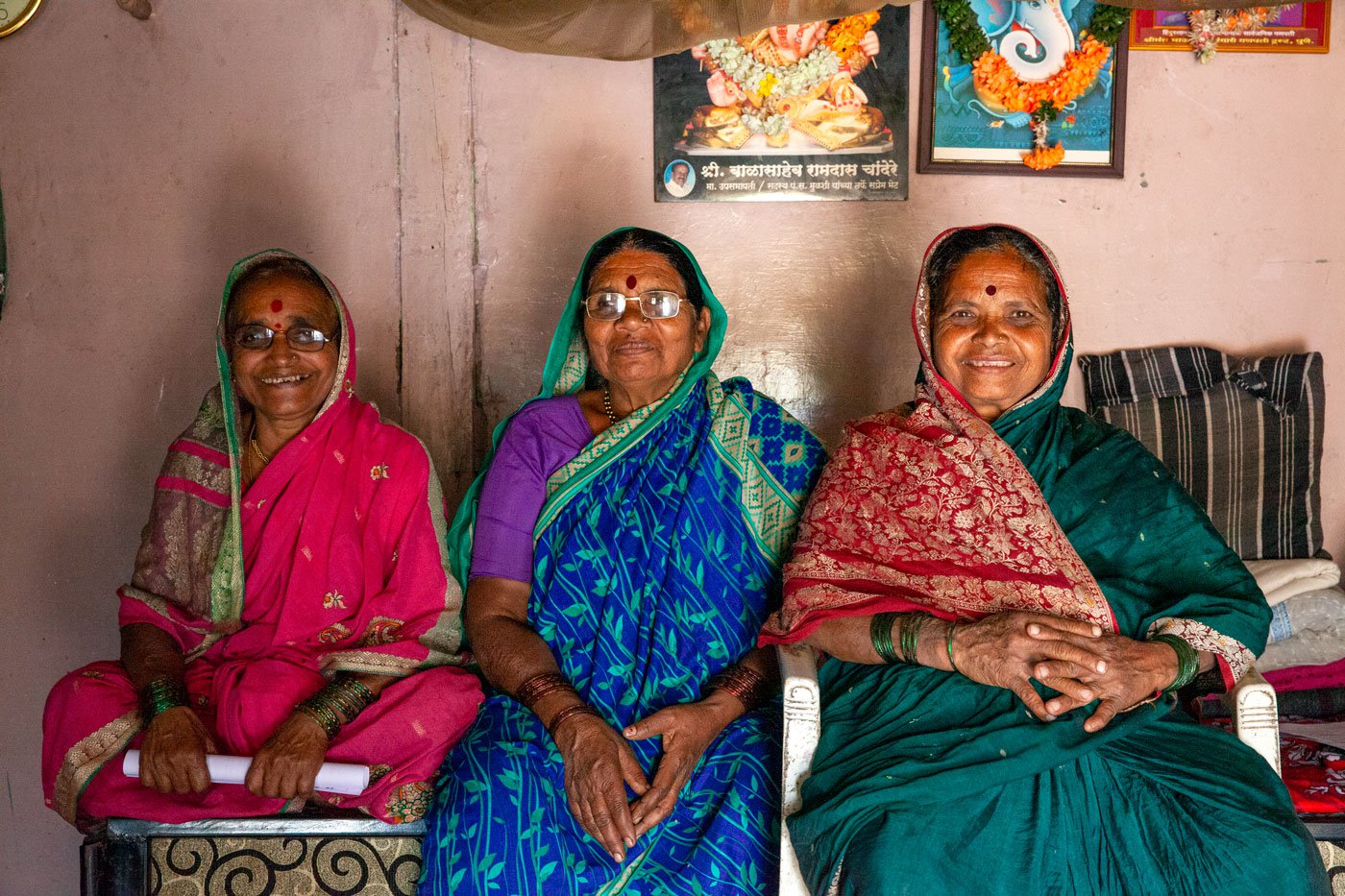
From left: Mukta Ubhe, Lila Kamble and Tara Ubhe
Performers/ Singers: Muktabai Ubhe
Village: Kolavade
Hamlet: Khadakwadi
Taluka: Mulshi
District: Pune
Caste: Maratha
Age: 65
Children: Three daughters and a son
Occupation: Farmer
Performer/Singer: Lilabai Kamble
Village: Kolavade
Taluka: Mulshi
District: Pune
Caste: Nav Bauddha (Neo Buddhist)
Age: 62
Children: Three sons
Occupation: Tenant farmer
Performer/Singer: Tarabai Ubhe
Village: Kolavade
Hamlet: Khadakwadi
Taluka: Mulshi
District: Pune
Caste: Maratha
Age: 61
Children: Three sons
Occupation: Farmer
Date:
These songs were recorded on February 20, 2022
Poster: Urja
Read more about the original Grindmill Songs Project founded by Hema Rairkar and Guy Poitevin.
